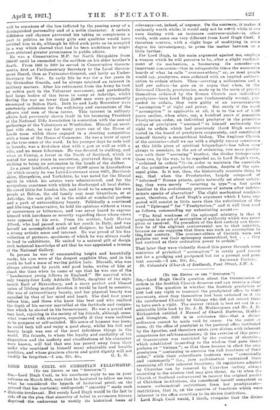LORD HUGH- CECIL ON. CHRISTIAN FELLOWSHIP. Pro THE. EDITOR. Or
Tar " SPECTATOR."]
Sni,—Lord Hugh Cecil, in his courteous reply- to me in your columns: on March 19th, says that he hesitated to follow me into what he -considered - the bypath of historical proof, on the ground that his-.(certainly. undisputed) "sincerity" made such • dialectic irrelevant. But surely Lord Hugh would be the last- to ride off on the plea-that sincerity of belief in erroneous history deprived... the- .endeavour. to rectify its historical basis of
relevancy—or, indeed, of urgency. On the contrary, it makes it eminently worth while; it would only not be worth while if one were dealing with an insincere. controversialist—in other words, with some one very different from Lord Hugh Cecil. I therefore venture, with a slight hope of modifying in some degree his intransigency, to press the matter between us a little further.
For Lord Hugh, in his main argument against me, employs a weapon which he will perceive to be, after a slight readjust- ment of its mechanism, a boomerang. Ile concedes—an important concession—that in subapoetolio times the successive boards of what he calls "overseer-elders," or, as most people would say, presbyters, were ordained with an implied authori- zation to ordain others. Then—covering a millennium and a half per saltum—he goes on to argue that when, in the Reformed Church, presbyteries, made up in the main of priests themselves ordained by the Roman Church (not individual presbyters—here Lord Hugh goes fundamentally wrong), pro- ceeded to ordain, they were guilty of an unwarrantable " assumption " of right and power. But surely if the word " assumption" is applicable at all, it is to the act of 1,500 years earlier, when after, say, a hundred years of peaceable Presbyterian order, an individual presbyter in the primitive college of presbyters " assumed " to himself exclusively the right to ordain which had previously (Lord Hugh assents) vested in the board of presbyters corporately, and constituted himself thereby a monarchical bishop.. The Anglican Church of the centuries—shall we say with a slightly uneasy conscience at this little piece of spiritual brigandage?—has taken care' always to associate, in the act of ordaining, two mere presby- ters with their "assuming" brother, the titular bishop—(are these two, by the way, to be regarded as, in Lord Hugh's view, " ordained to ordain "?)—in order to maintain the essentials of the primitive presbyterial ordination, despite of the epis- copal guise. Is it not, then, the historically accurate thing to say, that when the Presbyteries, largely composed of "reformed" Roman priests, quite naturally set about ordain- ing, they were merely " reverting to type "—a feat quite familiar in the evolutionary processes of nature after indeter- minate- epochs of aberration? The slight mechanical readjust- ment, therefore, of Lord Hugh's argument which I have sug- gested will consist in little more than the substitution of the word "Episcopal " for "Presbyterian," and it will then read as follows, commanding -my unhesitating assent:—
" The fatal weakness of the episcopal ministry is that it originates in an act of assumption of authority which was never given or received. No precedent of the first century can there- fore be of the slightest controversial use to that ministry, because no one supposes that there was such an assumption in
the.)first century. The overseer-elders of Corinth were not, prelates nor was their episeopaoy monarchical, but . . . they had received at their ordination power to ordain."
That later they were violently denied this power through some centuries of prelatical " assumption " is surely good reason not for a grudging and postponed but for a prompt and peni-


































 Previous page
Previous page